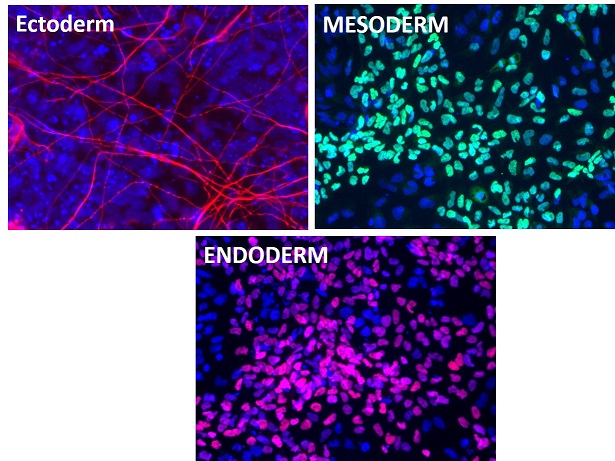Description
[vc_row][vc_column][vc_column_text css=””]Induced pluripotent stem cells (iPSCs) can be reprogrammed from adult somatic cells such as dermal fibroblasts, peripheral blood mononuclear cells (PBMCs), adipocytes, and others, through ectopic expression of specific transcription factors such as OCT4, SOX2, KLF4, and c-MYC, originally discovered by Dr. Yamanaka. With the advancement in mammalian cell line genetic engineering and optimal differentiation protocol development for various somatic lineages-of-choice, the true potential of the iPSCs was proven in the establishment of versatile and physiologically relevant cell line models for basic research, disease modeling, drug discovery, and regenerative medicine.
Regardless, the techniques and methods used for reprogramming, iPSC generation always results in heterogenous cell populations. Multiple iPSC clones are required to be established and carefully characterized and validated. Some standard characterizations include (but are not limited to): confirming expression of pluripotency markers (immunostaining for biomarkers, qPCR), G-banding karyotyping, array comparative genomic hybridization (aCGH), gene expression profiling, in vitro spontaneous or directed differentiation to the three germ layers (ectoderm, mesoderm, and endoderm), and in vivo teratoma formation to confirm functional pluripotency.
The gold standard for the pluripotency has been the teratoma formation assay where pluripotent cells are injected into immunocompromised mice and allowed to differentiate into teratomas with the cells from all three germ layers. Due to its lengthy process and the cost, the researchers are resorting to in vitro differentiation tests via Embryoid Body (EB) formation and directed differentiation to the tri-lineage germ layers.
Leveraging our 11+ years of expertise in stem cell biology, Applied StemCell has top-of-the-line, highly optimized and most current protocols for directed differentiation of your hiPSCs/hESCs to committed cell lineages of the three germ layers: ectoderm, mesoderm, and the endoderm.
- Three independent differentiation assays for the three germ layers and characterization
- A full set of characterization assays available for a comprehensive validation of your iPSCs
- Flexible and fully customized service to fit the needs of your projects
Service includes:
|
Catalog# |
Description |
|
ASC-9021 |
Direct differentiation to 3 germ layers for 1 iPSC clone |
|
ASC-9021-3 |
Direct differentiation to 3 germ layers for 3 iPSC clones |
- Directed differentiation of your hiPSC/ hESC to ectoderm, mesoderm, endoderm lineages
- Confirmation of cell lineage with 2 biomarkers specific to each lineage by immunostaining
- Inclusion of a proven wildtype iPSC as a positive control for the differentiation process
- Final project report with labeled images
Turnaround Time:
- 3-4 weeks
Cell Line Submission Requirement:
- Frozen iPSC cells; 1 x 10^6 cells/vial
- Free of mycoplasma
- Overnight shipment of the frozen vials on dry-ice or in dry shipper.
Direct Differentiation of Control Master iPSC Line, ASE-9209 into the Three Germ Layers
Figure 1. Immunofluorescent staining for lineage-specific biomarkers of three germ layers after direct differentiation of hiPSCs. Control hiPSC line, ASE-9209 (female, fibroblasts) were differentiated to specific lineages of the germ layers using well-established and optimized protocols. Immunostaining for biomarkers of each lineage was performed to confirm lineage commitment. Ectoderm markers: neuronal lineage markers, PAX6 (green), b-III Tubulin (red); Mesoderm markers: Brachyury (green) and GATA4 (red); Endoderm markers: SOX17 (green) and FOXA2 (red); DAPI (blue) was used to stain for nuclear localization.
Applied StemCell (ASC) offers several iPSC characterization services, so you can fully characterize your iPSCs to confidently move your research forward. If you do not see what you are looking for, contact us today to speak with one of our experts.[/vc_column_text][/vc_column][/vc_row]


Reviews
There are no reviews yet.